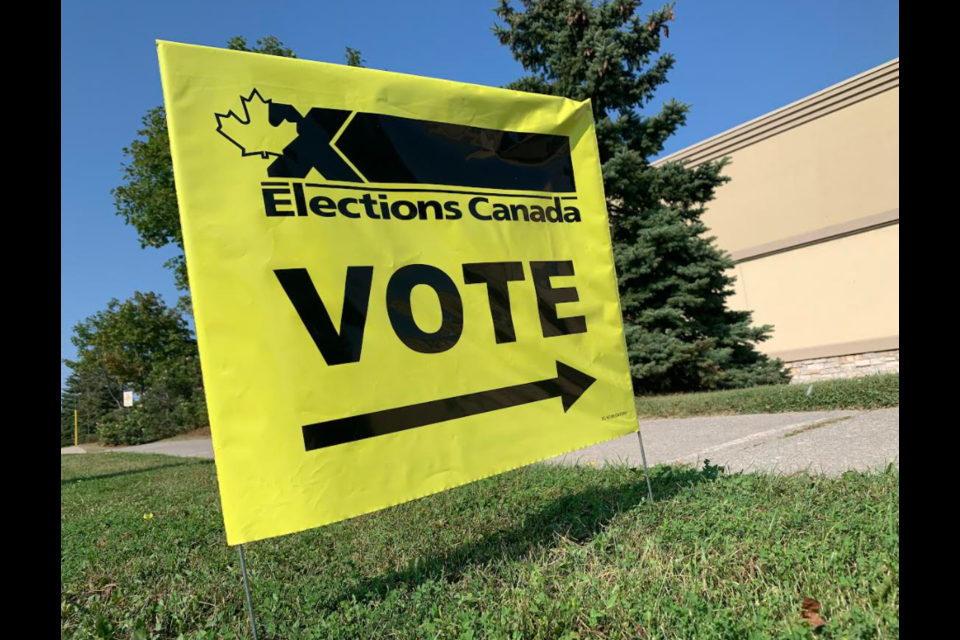Liberal leader Justin Trudeau may not have been doing local Liberal candidates — or anyone opposing the two Conservative incumbents in the Barrie-area ridings — any favours with the short five-week campaign period.
“If there isn’t any sort of a national groundswell of Liberal support, then a short campaign, going against two incumbents that are well-funded and well-known, then you’re really putting your candidates in a difficult, not impossible, but a difficult position,” said Michael Johns, a visiting professor in the department of politics at York University.
Individual ridings usually take on a life of their own in the weeks leading up to an election and it’s an opportunity for all the candidates to get exposure, get their message out and take advantage of trends that often develop on a national or provincial level in their attempt to win the election.
But incumbents have an advantage, explained Johns, a local political scientist. And when those candidates are Conservatives in ridings that have often leaned Conservative, that advantage turns into a head start.
“Everything’s a little bit harder for the non-Conservative candidates because the Conservative candidates know they’re kind of starting with a lead. In a really short campaign of 36 days, that’s a sprint,” said Johns. “It’s a 100-metre sprint; one of them is starting at the 20-metre mark and all the other parties are probably starting at the starting line.
“So you have less time if you want to catch up.”
And that was further widened for the Green Party in Barrie-Innisfil where its candidate withdrew their nomination and the search was on for a replacement. The party announced late Friday afternoon that it had a new candidate in place named Sandra Anderson. The Greens have yet to announce a candidate in Barrie-Springwater-Oro-Medonte.
Non-Conservative candidates also have less time to organize and fund-raise — areas which the Conservatives have dominated locally.
Johns points to the 2019 election when Conservative John Brassard won 43.8 per cent of the vote in Barrie-Innisfil, spending $67,000 on his campaign. Liberal Lisa-Marie Wilson, by contrast, captured 29.27 per cent of the vote with a budget of $25,000, less than half of what Brassard spent.
They are once again facing each other in this election.
In that same riding in 2019, New Democrat Pekka Reinio spent $12,000 and got 16.7 per cent of the vote. The Green Party’s Bonnie North captured 8.9 of the vote and Stephanie Robinson of the People's Party of Canada won 1.87 per cent of the vote — both claimed no expenses.
Meanwhile, in Barrie-Springwater-Oro-Medonte, Conservative Doug Shipley captured 39 per cent of the vote, relying upon a treasure chest of $101,000. Liberal Brian Kalliecharan got 31.2 per cent of the vote and spent $85,000.
New Democrat Dan Janssen got 14.8 per cent of the vote and spent nearly $12,000. The Greens' Marty Lancaster got 13.1 per cent, declaring no expenses. People's Party of Canada candidate David Patterson won 1.8 per cent of the vote and spent $3,100.
“The Conservative machine that is in both Barrie ridings is just well established and therefore they have access to resources more quickly than maybe the other parties do,” said Johns.
“In a really short campaign, it makes it much harder for the parties that have less immediate support. And it probably means that in order to win these ridings, there has to be a big movement provincially or nationally that catches you in that wave," he added.
Conservatives have held the area for the past decade and a half, although Barrie-area residents have sent Liberals to Ottawa in the past, most recently Aileen Carroll from 1997 to 2006.
In their current configurations, Johns says there are distinctions between the two Barrie ridings and how the people within them vote.
“That riding (Barrie-Springwater-Oro-Medonte) is more competitive, so it is demographically different then the southern riding,” said Johns. “You can’t treat them the same.”
He added that Barrie-Innisfil is more rural, which tends to be more Conservative.
Johns pointed out that agreeing to be a candidate is a huge commitment for any individual.It means putting their previously scheduled lives on hold for 36 days to knock on doors, issue messages and raise money to support the campaign.
“It’s an enormous effort and an enormous personal sacrifice to run for office” for any individual, no matter what their political stripes, he said.
The federal election will take place Sept. 20.



